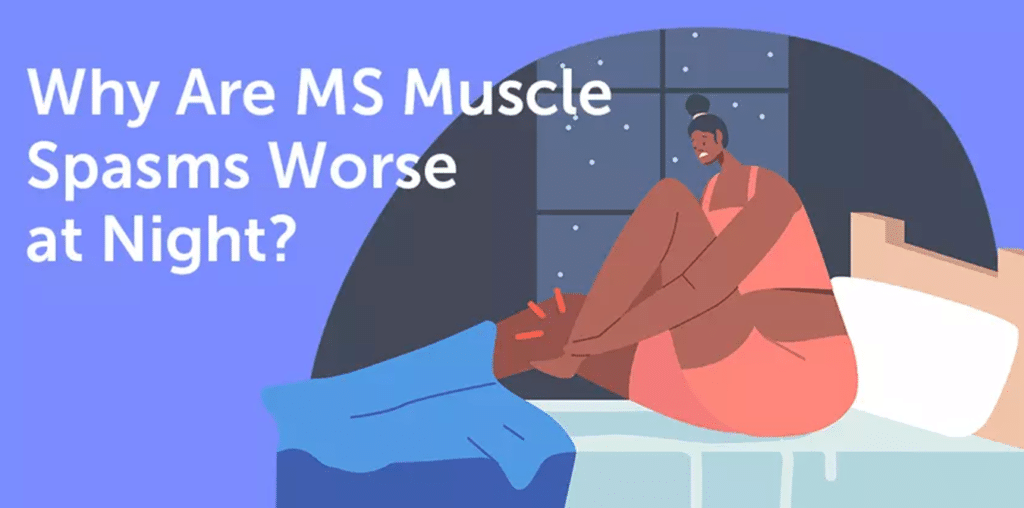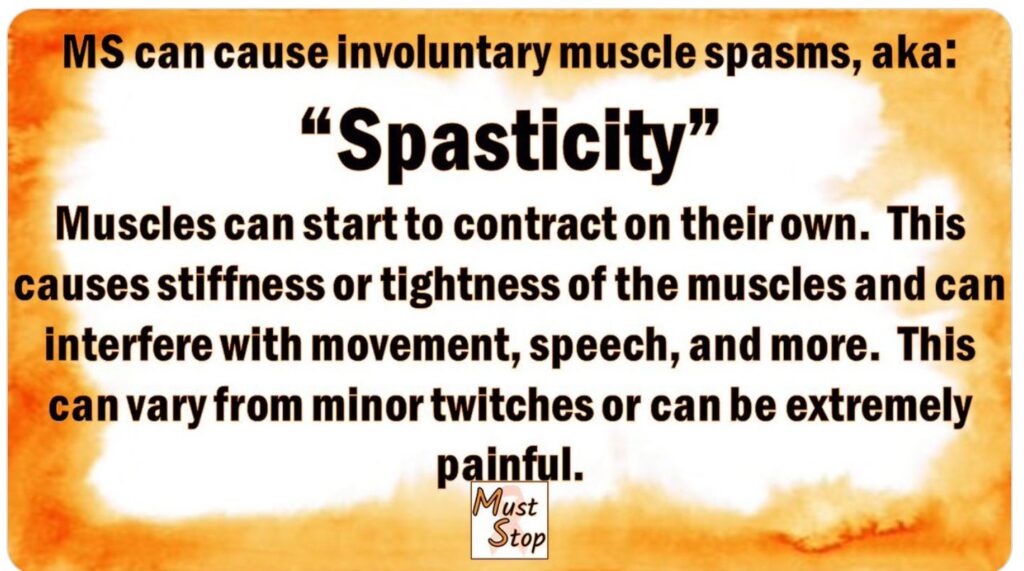Medically reviewed by Joseph V. Campellone, M.D.
Updated on February 1, 2024

(though you cannot see it, I think my name is written all over this article, as Spasms affect me just about every night)
Written by Emily Brown
“I couldn’t sleep because of spasms,” one MyMSTeam member shared.
Muscle spasms are common among people with multiple sclerosis (MS), and they can feel worse at night. As many as 80 percent of people with MS experience muscle spasms or stiffness. Spasms can be painful and make parts of the body jerk uncontrollably. Leg spasms often happen during sleep, which can make it hard to get a good night’s rest.

Reduced movement, body positioning, and temperature may play a role in making muscle spasms feel worse at night. Learn more about nighttime muscle spasms and tips for managing them.
Why Do MS Muscle Spasms Happen at Night?
According to the National Multiple Sclerosis Society, spasticity is one of the most common symptoms of MS. MS-related nerve damage in the brain and spinal cord can disrupt normal muscle contractions, causing muscles to jerk. MS spasticity, which makes for stiff or tight muscles, can cause muscles to spasm when the muscle is stretched, such as when you move your legs.
Muscle spasms can be worse at night because spasticity is worse when you move less, such as when you’re sleeping. Your body positioning in your bed also matters — unsupported joints can cause extra tension and tightness in your muscles. In addition, tight muscles and pain associated with MS can make it hard to relax, which not only makes it harder to sleep but can also lead to muscle stiffness associated with spasms.
Muscle spasms can be worse at night because spasticity is worse when you move less, such as when you’re sleeping.
Fatigue is a common trigger for spasticity, so addressing fatigue is an important part of managing spasticity and spasms. However, managing fatigue can be much easier said than done. Other triggers of spasticity include temperature changes, stress, and anxiety.
How Do Muscle Spasms at Night Affect People With MS?
Muscle spasms at night may cause you to lose sleep and become more fatigued. Having insomnia is hard enough, let alone managing symptoms of MS while you’re trying to sleep. Sometimes, just knowing you are not alone can help. Many MyMSTeam members express the pain and frustration of dealing with muscle spasms at night:
- “I get them every day — sometimes, even in the middle of the night. I was just drifting off to sleep last night when the arch of my left foot decided to do something.”
- “Had a horrible foot spasm last night, and my hip was hurting for days too.”
- “Bad night with left and right shoulder and arm spasm.”
- “Last night kinda sucked … not much sleep due to left leg spasms.”

“I get them every day — sometimes, even in the middle of the night. I was just drifting off to sleep last night when the arch of my left foot decided to do something.”
— A MyMSTeam member
Tips for Managing MS Muscle Spasms at Night
MS muscle spasms are common, but they can be managed. Managing spasticity, in general, can help reduce spasms at night. There are several treatment options for muscle spasms and stiffness, such as:
- Physical therapy and occupational therapy
- Muscle relaxants and medications such as baclofen (Lioresal), tizanidine (Zanaflex), dantrolene (Dantrium), gabapentin (Lyrica), diazepam (Valium), clonazepam (Klonopin), or onabotulinumtoxin A (Botox)
- Equipment like braces or splints for stretching stiff muscles
- Electrical stimulation therapy
Exercise for Muscle Spasms
Exercise can also help with spasms, as it increases flexibility and muscle tone. Gentle exercises like yoga, gardening, and range-of-motion exercises can be good places to start. Check with your health care provider or a physical therapist before beginning any new exercise routine to make sure it works for you and doesn’t aggravate your MS symptoms.
You can try to manage your muscle spasms at home. Consider some tips for preventing MS spasms that you can start tonight:
- Make sure your mattress is supportive enough and you have plenty of pillows.
- Ensure good positioning when you lie down, with support for your neck and back to reduce strain.
- Avoid sleeping in tight pajamas or other garments.
- Keep a comfortable temperature where you sleep, using air conditioning, a fan, heating, or more or less bedding as necessary.
If you find yourself with spasms in the middle of the night, try some stretching exercises in bed. For example, pull your knees into your chest and let one knee fall to the opposite side, and repeat on the other side. You can also try flexing your feet and pointing your toes.
Stay informed with MS news and information - Sign-up here
For MS patients, caregivers or clinicians, Care to chat about MS? Join Our online COMMUNITY



